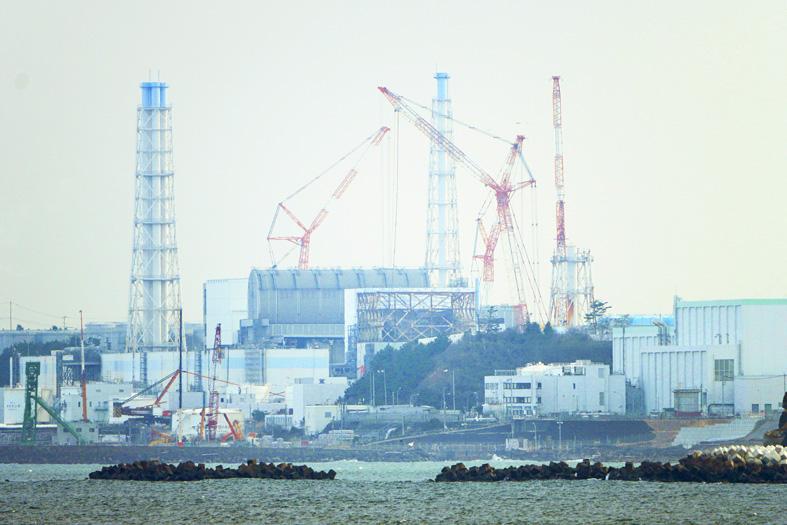A team of Taiwanese experts is to depart for Japan tomorrow to inspect wastewater from the disabled Fukushima Dai-ichi nuclear power plant, with a report on its findings expected in a month.
Experts are visiting to evaluate plans announced by Tokyo last year to gradually discharge more than 1.25 million cubic meters of treated water from the plant into the sea starting in the spring of next year at the earliest.
It follows another visit last month by a delegation from the International Atomic Energy Agency (IAEA) that gathered information about the plan and collected wastewater samples from the plant that was damaged after a 2011 earthquake and tsunami.

Photo: AP
However, Chinese Nationalist Party (KMT) legislators have questioned the impartiality of the Atomic Energy Council (AEC), accusing it of helping Tokyo “whitewash” the situation in an explainer on its Web site.
AEC Minister Hsieh Shou-shing (謝曉星) before a routine hearing at the Legislative Yuan yesterday told reporters that the council submitted a formal objection to Tokyo as soon as it announced the plan in April last year.
Later at the hearing, legislators called on Hsieh to establish preliminary response measures to the potential effects of wastewater contamination and to publicly report on its progress.
Not even the IAEA made preliminary judgements before its inspection of the plant, and any discharge would have to meet internationally agreed standards, Hsieh said, adding that this was why the IAEA and Taiwan are sending inspectors.
As for its potential effect on the fishing industry, Hsieh deferred to the Fisheries Agency, but added that the AEC has plans to set up a platform for agencies to inform each other of preventive measures.
Questioned about the AEC’s out-of-date online explainer, which still says that an IAEA delegation “is to” visit Japan, Hsieh said that the international agency is not releasing the results of its investigation until next month.
The AEC maintained communications with the IAEA delegation during its visit, but it cannot share that information until the agency releases its report, Hsieh said.
After legislators expressed concern about how the Taiwanese delegation would be treated, Hsieh said that the AEC’s team would request that it receive the same treatment as the IAEA delegation.

MAKING WAVES: China’s maritime militia could become a nontraditional threat in war, clogging up shipping lanes to prevent US or Japanese intervention, a report said About 1,900 Chinese ships flying flags of convenience and fishing vessels that participated in China’s military exercises around Taiwan last month and in January last year have been listed for monitoring, Coast Guard Administration (CGA) Deputy Director-General Hsieh Ching-chin (謝慶欽) said yesterday. Following amendments to the Commercial Port Act (商港法) and the Law of Ships (船舶法) last month, the CGA can designate possible berthing areas or deny ports of call for vessels suspected of loitering around areas where undersea cables can be accessed, Oceans Affairs Council Minister Kuan Bi-ling (管碧玲) said. The list of suspected ships, originally 300, had risen to about

DAREDEVIL: Honnold said it had always been a dream of his to climb Taipei 101, while a Netflix producer said the skyscraper was ‘a real icon of this country’ US climber Alex Honnold yesterday took on Taiwan’s tallest building, becoming the first person to scale Taipei 101 without a rope, harness or safety net. Hundreds of spectators gathered at the base of the 101-story skyscraper to watch Honnold, 40, embark on his daredevil feat, which was also broadcast live on Netflix. Dressed in a red T-shirt and yellow custom-made climbing shoes, Honnold swiftly moved up the southeast face of the glass and steel building. At one point, he stepped onto a platform midway up to wave down at fans and onlookers who were taking photos. People watching from inside

Japan’s strategic alliance with the US would collapse if Tokyo were to turn away from a conflict in Taiwan, Japanese Prime Minister Sanae Takaichi said yesterday, but distanced herself from previous comments that suggested a possible military response in such an event. Takaichi expressed her latest views on a nationally broadcast TV program late on Monday, where an opposition party leader criticized her for igniting tensions with China with the earlier remarks. Ties between Japan and China have sunk to the worst level in years after Takaichi said in November that a hypothetical Chinese attack on Taiwan could bring about a Japanese

The WHO ignored early COVID-19 warnings from Taiwan, US Deputy Secretary of Health and Human Services Jim O’Neill said on Friday, as part of justification for Washington withdrawing from the global health body. US Secretary of State Marco Rubio on Thursday said that the US was pulling out of the UN agency, as it failed to fulfill its responsibilities during the COVID-19 pandemic. The WHO “ignored early COVID warnings from Taiwan in 2019 by pretending Taiwan did not exist, O’Neill wrote on X on Friday, Taiwan time. “It ignored rigorous science and promoted lockdowns.” The US will “continue international coordination on infectious